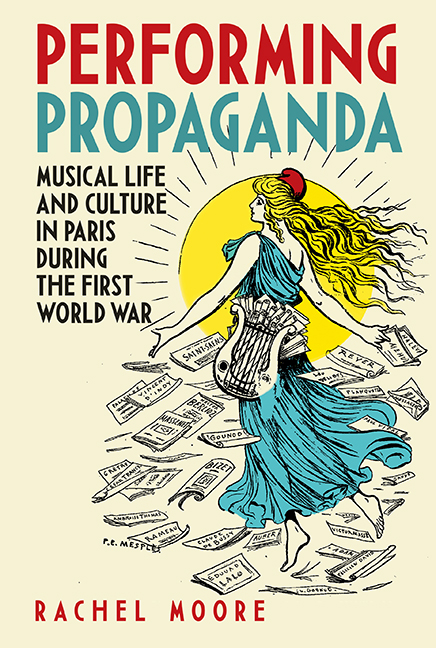 Performing Propaganda: Musical Life and Culture in Paris during the First World War
Performing Propaganda: Musical Life and Culture in Paris during the First World War Book contents
- Frontmatter
- Contents
- List of Illustrations
- List of Tables
- Acknowledgements
- List of Abbreviations
- Introduction
- 1 Musical Institutions on the Home Front
- 2 The Origins of Wartime Musical Propaganda: From the Written Word to Performing Globetrotters
- 3 Saint-Saëns's Germanophilie as a Propaganda Prototype
- 4 Propaganda on the Concert Stage: The Matinées Nationales
- 5 Creativity and Compromise at the Opéra
- 6 Music Publishing and the Édition Française de Musique Classique
- Conclusion
- Bibliography
- Index
- Miscellaneous Endmatter
- Frontmatter
- Contents
- List of Illustrations
- List of Tables
- Acknowledgements
- List of Abbreviations
- Introduction
- 1 Musical Institutions on the Home Front
- 2 The Origins of Wartime Musical Propaganda: From the Written Word to Performing Globetrotters
- 3 Saint-Saëns's Germanophilie as a Propaganda Prototype
- 4 Propaganda on the Concert Stage: The Matinées Nationales
- 5 Creativity and Compromise at the Opéra
- 6 Music Publishing and the Édition Française de Musique Classique
- Conclusion
- Bibliography
- Index
- Miscellaneous Endmatter
Summary
AFTER DAYS spent trawling through the catalogues in a Parisian archive, searching vainly for documents relating to music during the First World War, I was excited one morning to come across the following entry: Concerts: 1914– 1918. It seemed promising. I duly filled in a request slip and returned to my desk, eagerly awaiting the arrival of the file which might hold the vital information for which I was hunting. Two hours later, the documents had not arrived. Instead, my request slip was returned, with a note from one of the archive's staff: ‘pas de concerts – période de guerre’. I was confused: even the most cursory flick through the pages of the music periodical, Le courrier musical, for 1916 and 1917 provided evidence that the archivist's assumption was not entirely accurate. And so, at the risk of infuriating the staff, I returned regularly to the archive over the ensuing weeks to try and get hold of the documents. After persistent attempts, and on the verge of capitulating to the archivist's dogmatism, I was rewarded: not only did the catalogued file exist, but it included a bundle of concert programmes which testified to an infinitely bigger number and breadth of musical performances during the war than I – and certainly the archive staff – had imagined.
The initial response from the archivist assumed that the fact of a war taking place necessarily resulted in an absence of musical activity. Yet it was precisely because of the war that I was interested in this period of music history. The assumption was not altogether surprising: from traditional narratives of music history, it is all too easy to emerge with a view of France's capital city during the First World War in which many of its most enjoyable activities such as music and entertainment ground to a halt, or continued in diminished form. The First World War has provided scholars with a convenient and seductive ready-made period of transition or period boundary, clearly evident in the large numbers of volumes on French music in which the start or end of the First World War are utilised as convenient points of termination or departure; this encourages the idea of the war as a moment of change, but also provides a reason not to dwell on the war period itself.
- Type
- Chapter
- Information
- Performing Propaganda: Musical Life and Culture in Paris during the First World WarMusical Life and Culture in Paris during the First World War, pp. 1 - 16Publisher: Boydell & BrewerPrint publication year: 2018
